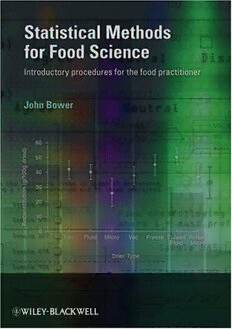Download Statistical Methods for Food Science: Introductory procedures for the food practitioner PDF Free - Full Version
Download Statistical Methods for Food Science: Introductory procedures for the food practitioner by John Bower in PDF format completely FREE. No registration required, no payment needed. Get instant access to this valuable resource on PDFdrive.to!
About Statistical Methods for Food Science: Introductory procedures for the food practitioner
The recording and analysis of food data are becoming increasingly sophisticated. Consequently, the food scientist in industry or at study faces the task of using and understanding statistical methods. Statistics is often viewed as a difficult subject and is often avoided because of its complexity and a lack of specific application to the requirements of food science. This situation is changing – there is now much material on multivariate applications for the more advanced reader, but a case exists for a univariate approach aimed at the non-statistician.This book provides a source text on accessible statistical procedures for the food scientist, and is aimed at professionals and students in food laboratories where analytical, instrumental and sensory data are gathered and require some form of summary and analysis before interpretation. It is suitable for the food analyst, the sensory scientist and the product developer, and others who work in food-related disciplines involving consumer survey investigations will also find many sections of use. There is an emphasis on a ‘hands on’ approach, and worked examples using computer software packages and the minimum of mathematical formulae are included. The book is based on the experience and practice of a scientist engaged for many years in research and teaching of analytical and sensory food science at undergraduate and post-graduate level.
Detailed Information
| Author: | John Bower |
|---|---|
| Publication Year: | 2009 |
| ISBN: | 9781405167642 |
| Pages: | 321 |
| Language: | English |
| File Size: | 2.584 |
| Format: | |
| Price: | FREE |
Safe & Secure Download - No registration required
Why Choose PDFdrive for Your Free Statistical Methods for Food Science: Introductory procedures for the food practitioner Download?
- 100% Free: No hidden fees or subscriptions required for one book every day.
- No Registration: Immediate access is available without creating accounts for one book every day.
- Safe and Secure: Clean downloads without malware or viruses
- Multiple Formats: PDF, MOBI, Mpub,... optimized for all devices
- Educational Resource: Supporting knowledge sharing and learning
Frequently Asked Questions
Is it really free to download Statistical Methods for Food Science: Introductory procedures for the food practitioner PDF?
Yes, on https://PDFdrive.to you can download Statistical Methods for Food Science: Introductory procedures for the food practitioner by John Bower completely free. We don't require any payment, subscription, or registration to access this PDF file. For 3 books every day.
How can I read Statistical Methods for Food Science: Introductory procedures for the food practitioner on my mobile device?
After downloading Statistical Methods for Food Science: Introductory procedures for the food practitioner PDF, you can open it with any PDF reader app on your phone or tablet. We recommend using Adobe Acrobat Reader, Apple Books, or Google Play Books for the best reading experience.
Is this the full version of Statistical Methods for Food Science: Introductory procedures for the food practitioner?
Yes, this is the complete PDF version of Statistical Methods for Food Science: Introductory procedures for the food practitioner by John Bower. You will be able to read the entire content as in the printed version without missing any pages.
Is it legal to download Statistical Methods for Food Science: Introductory procedures for the food practitioner PDF for free?
https://PDFdrive.to provides links to free educational resources available online. We do not store any files on our servers. Please be aware of copyright laws in your country before downloading.
The materials shared are intended for research, educational, and personal use in accordance with fair use principles.

